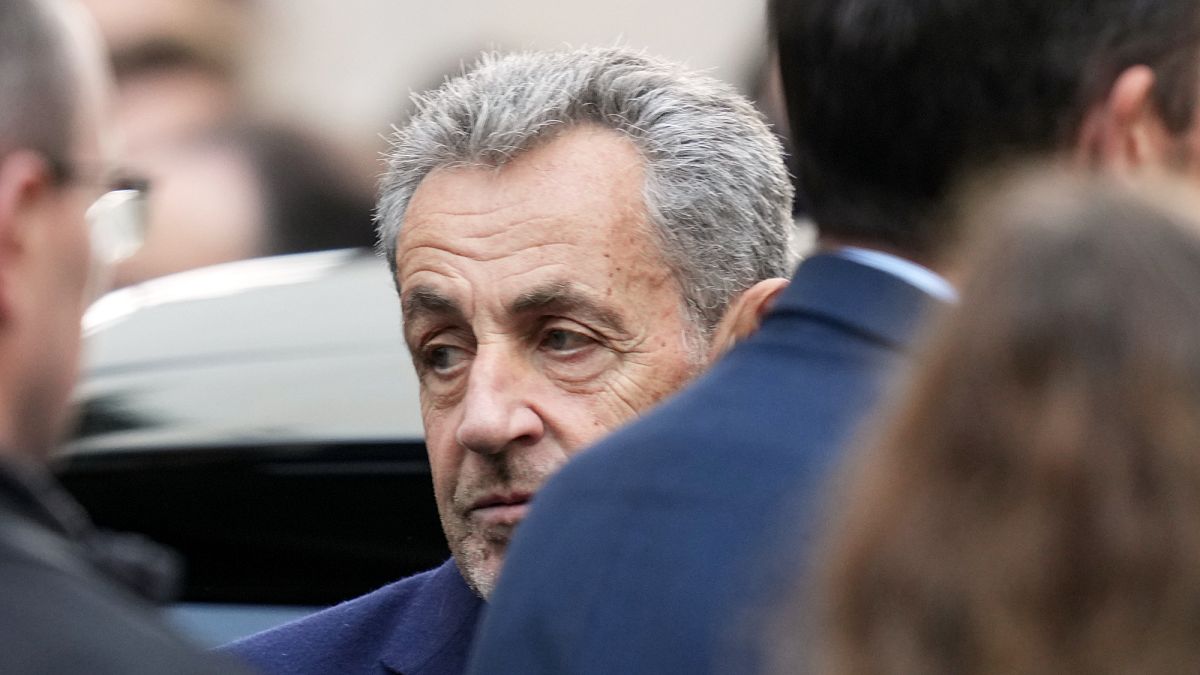
France’s former President Nicolas Sarkozy began his five-year prison sentence on 21 October, after being found guilty of conspiring to fund his 2007 presidential campaign with illicit funds from Libya’s former leader, the late Muammar Gaddafi.
In one social media video analysed by Euronews’ verification team, The Cube, an inmate can be seen filming a video through the bars of his prison cell.
Pointing across to the other side of a prison courtyard, he says, “Sarko [Sarkozy] is just there in the isolated section, all alone in his cell.”
The inmate goes on to shout, “We know everything, we’re going to avenge Gaddafi. We know everything, Sarko.”
The Cube identified another video which was filmed and broadcast as a live stream on TikTok, which shows a prison courtyard at night.
The inmate filming the video can be heard laughing before reading a comment posted on the livestream, stating, “call Sarko.”
Responding to the comment, the inmate said: “Send a donation if you want me to wake him up, did you think it was free or what?”, before shouting “Sarkozy, Nicolas!”
The inmates’ request for money in exchange for shouting Sarkozy’s name aligns with the fact that The Cube has detected separate instances of prisoners posting on TikTok — in instances unrelated to Sarkozy — and asking for donations.
The Paris prosecutor’s office confirmed that at least one of the videos identified by The Cube was authentic, adding that three inmates were placed in police custody over the matter on 22 October.
“An administrative search was carried out by the prison administration, during which two phones were seized,” it said.
“The Paris public prosecutor’s office has opened an investigation into death threats, entrusted to the 3rd district of the judicial police,” added the prosecutor’s office. “The three inmates present in the cell have been taken into custody.”
We sent both videos that we identified to a prisoners’ rights organisation familiar with the layout of the prison de la Santé, who confirmed the authenticity of the footage.
“The inmates in these videos are incarcerated in cells located opposite the isolation and disciplinary wards,” François Korber, founder of French prisoners’ rights organisation Robins des Lois, who spent 25 years in prison, told Euronews.
“You can hear them shouting to let their friends know where Nicolas Sarkozy is. New prisoners often get ‘welcomes’ upon arrival, but when it’s, let’s say, a famous rapper who has just arrived, they are usually more welcoming,” added Korber.
Are mobile phones allowed in prisons?
High-profile political figures in France have also shared some of the videos posted by the inmates.
The far-right National Rally party’s Marine Le Pen, who is currently appealing against an embezzlement conviction, reshared one video on X, stating: “I have no doubt that some people must be delighted by this situation. But I want to believe that millions of French people feel, like me, disgust.”
For many others, it is not the reception fellow inmates handed to Sarkozy which has raised eyebrows, but the presence of mobile phones inside prisons.
Upon its reopening in 2019 after five years of renovation works, the prison de la Santé became France’s first prison to be equipped with landlines in individual cells.
The establishment also implemented a new phone scrambling system, aimed at cracking down on the illegal use of mobile phones inside its walls.
However, despite measures taken by the prison de la Santé, as well as the French government’s formal ban on mobile phones inside prisons, these devices are commonplace.
Some 53,000 phones were seized in France’s prisons in 2023, while a further 40,000 were confiscated in 2024, according to the Ministry of Justice.
“There are multiple reasons for this, but ultimately, there is corruption in prisons, so phones get in, but prisons can turn a blind eye to phones because it keeps things in order,” said Korber. “A lot of prisoners who have a phone use it to call their family. I know lots of inmates who have dinner with their children in the evening over a video call.”
“Scrambling technologies are also not that efficient, especially in densely populated areas. The prison de la Santé is right in the heart of Paris”, he added. “There is also the fact that sometimes prisons get intel from tapping calls inmates make from their mobile phones.”
